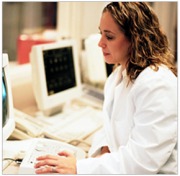
Why Medical Transcription Services Should be Precise, Private and Secure
It is not worth using the services of a particular service provider if you always find errors in the transcripts. Precision is important to ensure that the patient receives the right medical care. The patient’s file would be passed around among various healthcare professionals as a reference of the patient’s medical history, allergies and other vital information. Even a small error in this information could result in faulty treatment/continuing care and sometimes even death. Secondly, an error-free medical record is an important documentation resource that can save a physician when he faces a case of medical malpractice. An accurate medical record also helps to ensure that a physician promptly gets paid for his services by the concerned insurance carriers.
Coming to confidentiality, the leak of Patient Health Information (PHI), whether knowingly or unknowingly, is a serious matter for which legal action would be imposed. The HIPAA Act calls for protection of all individually identifiable patient information such as name, birth date, address and Social Security Number. This information must be protected whether transmitted in paper mode, electronically or orally.
Measures Adopted
Medical transcription outsourcing companies adopt effective strategies to ensure that precision and confidentiality are never compromised. Some of these measures are outlined below.
For Accuracy
• Employment of personnel who are fluent in English
• Providing training to these personnel in medical terminology and etymology, diseases, human anatomy, laboratory procedures and other relevant topics
• Providing training in the English language including spelling, punctuation, grammar and style
• Developing their research skills to search for medical words and drug names
• A three tiered process of quality control with contributions from editors and proofreaders
• Flagging wherever there is a doubt instead of typing the wrong word (s)
For Confidentiality
Computers are secured with passwords and up-to-date anti-virus software and firewalls. Employees are made to sign documents pertaining to privacy and non-disclosure; employees are searched when they enter and before they leave the office premises. Random checks are carried out to ensure conformity to security requirements. Back-ups are performed each month and the back-up data is kept safe from illegal access in a locked outbuilding on the medical transcription company’s property.
• Floppy disk drives and other external drives are made inoperative on each computer
• 256 bit AES encryption
• Fire extinguisher and smoke alarm are kept in the office within easy access
• Employees cannot bring into the office or take out from it plain paper, paper on which something is written, documents or electronic devices
• Protection provided by security personnel 24/7
• PHI document copies and damaged hard copies of notes are shredded on-site.
Taking full advantage of a free trial and asking questions can help you determine whether the service provider you are thinking of outsourcing to can achieve the level of accuracy and confidentiality you expect in medical transcription.




 RSS Feed
RSS Feed